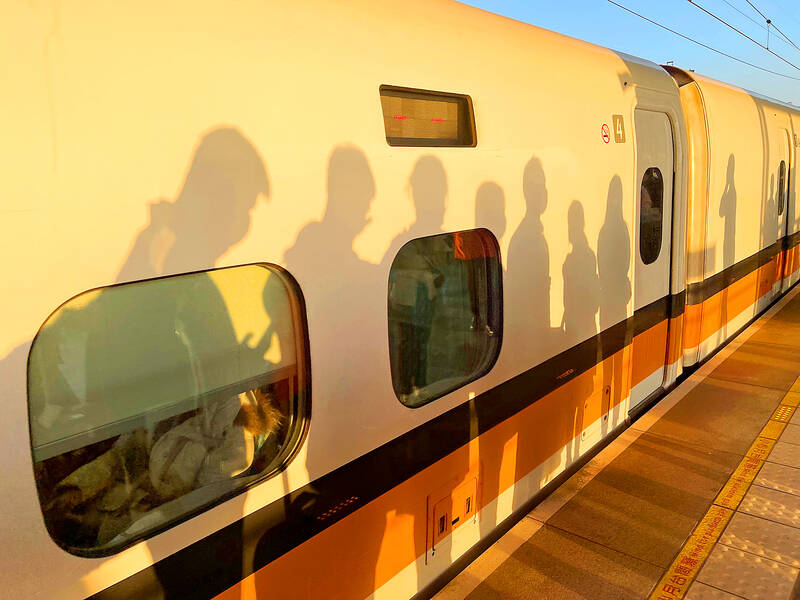The number of high-speed rail passengers hit a record-high 73.03 million last year due to a strong recovery in railway travel following the easing of the COVID-19 pandemic, Taiwan High-Speed Rail Corp (THSRC) said yesterday.
The increase in demand for high-speed rail services translated to NT$49.8 billion (US$1.6 billion) in revenue last year, an all-time record, THSRC business senior vice president Calvin Yen (顏昭立) told reporters
Meanwhile, pretax net profit reached NT$9.7 billion, the highest since the high-speed rail company began operations in 2007.

Photo: CNA
Aside from commuters and business travelers, the high-speed rail operator attracted 4.02 million passengers last year who boarded for tourism purposes, Yen said.
In response to the robust growth in ridership, the company increaseed its weekly train services from 1,039 last year to 1,060 this year, he added.
“However, we have noticed that the average daily passenger volume during the Lunar New Year holiday was about 310,000, which has returned to normal,” he said.
Despite significant growth in passenger volume and revenue, the operational costs of high-speed rail services also increased last year, Yen said.
The system’s maintenance costs rose to NT$2.9 billion last year, up from NT$2.7 billion in 2022, while personnel costs jumped 19 percent to NT$6.2 billion last year, Yen said.
Taiwan Power Co’s electricity fee adjustment last year increased the company’s electricity expenses by NT$300 million annually.
The state-run power firm on Monday announced that an overall price hike is expected in April.
Asked whether the company is planning to raise ticket prices given the rising costs, Yen said that any adjustment in ticket price would require taking into account various factors as well as approval from the Ministry of Transportation and Communications.
“We would first assess how a ticket price adjustment could affect the public before making any proposal,” he said.
Any new discounts available to THSRC members would be to maximize revenue, rather than to reduce it, Yen said.
“While discounts might increase the number of passengers accessing the high-speed rail and ease the congestion in peak hours by moving some of the passengers to off-peak hours, there might be a decline in revenue if discounts do not lead to a significant rise in passengers,” Yen said, adding that it would review the discounts available to THSRC members.

Chinese spouse and influencer Guan Guan’s (關關) residency permit has been revoked for repeatedly posting pro-China videos that threaten national security, the National Immigration Agency confirmed today. Guan Guan has said many controversial statements in her videos posted to Douyin (抖音), including “the red flag will soon be painted all over Taiwan” and “Taiwan is an inseparable part of China,” and expressing hope for expedited reunification. The agency last year received multiple reports alleging that Guan Guan had advocated for armed reunification. After verifying the reports, the agency last month issued a notice requiring her to appear and explain her actions. Guan

GIVE AND TAKE: Blood demand continues to rise each year, while fewer young donors are available due to the nation’s falling birthrate, a doctor said Blood donors can redeem points earned from donations to obtain limited edition Formosan black bear travel mugs, the Kaohsiung Blood Center said yesterday, as it announced a goal of stocking 20,000 units of blood prior to the Lunar New Year. The last month of the lunar year is National Blood Donation Month, when local centers seek to stockpile blood for use during the Lunar New Year holiday. The blood demand in southern Taiwan — including Tainan and Kaohsiung, as well as Chiayi, Pingtung, Penghu and Taitung counties — is about 2,000 units per day, the center said. The donation campaign aims to boost

The Kaohsiung Tourism Bureau audited six hotels in an effort to prevent price gouging ahead of Korean band BTS’ concert tour in the city scheduled for Nov. 19, 21 and 22 this year. The bureau on Friday said that the audits — conducted in response to allegations of unfair pricing posted on social media — found no wrongdoing. These establishments included the local branches of Chateau de Chine, Hotel Nikko, My Humble House, and Grand Hai Lai, it said, adding that the Consumer Protection Commission would have penalized price gougers had the accusations been substantiated. The bureau said the Tourism Development Act

BACK TO WINTER: A strong continental cold air mass would move south on Tuesday next week, bringing colder temperatures to northern and central Taiwan A tropical depression east of the Philippines could soon be upgraded to be the first tropical storm of this year, the Central Weather Administration (CWA) said yesterday, adding that the next cold air mass is forecast to arrive on Monday next week. CWA forecaster Cheng Jie-ren (鄭傑仁) said the first tropical depression of this year is over waters east of the Philippines, about 1,867km southeast of Oluanpi (鵝鑾鼻), and could strengthen into Tropical Storm Nokaen by early today. The system is moving slowly from northwest to north, and is expected to remain east of the Philippines with little chance of affecting Taiwan,